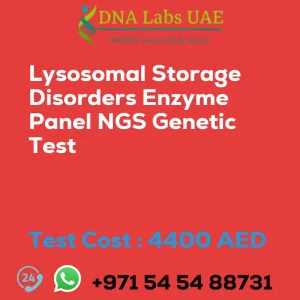CYP7B1 Gene Bile Acid Synthesis Defect Type 3 Congenital Genetic Test
Welcome to DNA Labs UAE, where we offer the CYP7B1 gene bile acid synthesis defect type 3 congenital genetic test. This test is designed to analyze the CYP7B1 gene, which encodes an enzyme called cytochrome P450 7B1. This enzyme plays a crucial role in bile acid synthesis, which is important for the digestion and absorption of dietary fats and fat-soluble vitamins.
Test Components
The CYP7B1 gene bile acid synthesis defect type 3 congenital genetic test includes:
- NGS Technology
Price
The cost of the CYP7B1 gene bile acid synthesis defect type 3 congenital genetic test is 4400.0 AED.
Sample Condition
We accept the following sample conditions for this test:
- Blood
- Extracted DNA
- One drop of blood on FTA Card
Report Delivery
You can expect to receive your test report within 3 to 4 weeks.
Method
The CYP7B1 gene bile acid synthesis defect type 3 congenital genetic test utilizes NGS (Next-Generation Sequencing) technology.
Test Type
This test falls under the category of metabolic disorders.
Doctor
This test can be ordered by a general physician.
Test Department
This test is conducted in our Genetics department.
Pre Test Information
Prior to undergoing the CYP7B1 gene bile acid synthesis defect type 3 congenital genetic test, it is recommended to provide the clinical history of the patient. Additionally, a genetic counseling session may be conducted to draw a pedigree chart of family members affected with bile acid synthesis defect type 3, congenital.
Test Details
The CYP7B1 gene is responsible for encoding an enzyme called cytochrome P450 7B1, which plays a crucial role in bile acid synthesis. Bile acids are important for the digestion and absorption of dietary fats and fat-soluble vitamins. A defect in the CYP7B1 gene can lead to a condition known as bile acid synthesis defect type 3, congenital (BASD3). This is a rare genetic disorder characterized by impaired bile acid synthesis, leading to a buildup of toxic bile acid intermediates in the liver.
NGS (Next-Generation Sequencing) genetic testing is a type of genetic testing that uses advanced sequencing technologies to analyze multiple genes simultaneously. In the case of CYP7B1 gene defects, NGS genetic testing can be used to identify mutations or variations in the gene that may be responsible for the development of BASD3. NGS genetic testing can provide valuable information for diagnosing and managing genetic conditions, including BASD3. It can help healthcare professionals determine the underlying cause of a patient’s symptoms, provide accurate genetic counseling, and guide treatment decisions.
It is important to note that genetic testing should always be done under the guidance of a healthcare professional or genetic counselor who can interpret the results and provide appropriate recommendations.
| Test Name | CYP7B1 Gene Bile acid synthesis defect type 3 congenital Genetic Test |
|---|---|
| Components | |
| Price | 4400.0 AED |
| Sample Condition | Blood or Extracted DNA or One drop Blood on FTA Card |
| Report Delivery | 3 to 4 Weeks |
| Method | NGS Technology |
| Test type | Metabolic Disorders |
| Doctor | General Physician |
| Test Department: | Genetics |
| Pre Test Information | Clinical History of Patient who is going for CYP7B1 Gene Bile acid synthesis defect type 3, congenital NGS Genetic DNA Test A Genetic Counselling session to draw a pedigree chart of family members affected with Bile acid synthesis defect type 3, congenital |
| Test Details |
The CYP7B1 gene is responsible for encoding an enzyme called cytochrome P450 7B1, which plays a crucial role in bile acid synthesis. Bile acids are important for the digestion and absorption of dietary fats and fat-soluble vitamins. A defect in the CYP7B1 gene can lead to a condition known as bile acid synthesis defect type 3, congenital (BASD3). This is a rare genetic disorder characterized by impaired bile acid synthesis, leading to a buildup of toxic bile acid intermediates in the liver. NGS (Next-Generation Sequencing) genetic testing is a type of genetic testing that uses advanced sequencing technologies to analyze multiple genes simultaneously. In the case of CYP7B1 gene defects, NGS genetic testing can be used to identify mutations or variations in the gene that may be responsible for the development of BASD3. NGS genetic testing can provide valuable information for diagnosing and managing genetic conditions, including BASD3. It can help healthcare professionals determine the underlying cause of a patient’s symptoms, provide accurate genetic counseling, and guide treatment decisions. It is important to note that genetic testing should always be done under the guidance of a healthcare professional or genetic counselor who can interpret the results and provide appropriate recommendations. |








